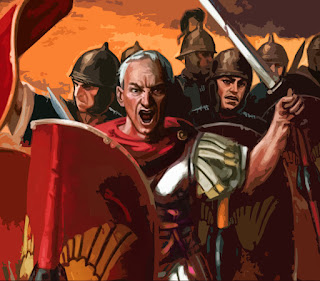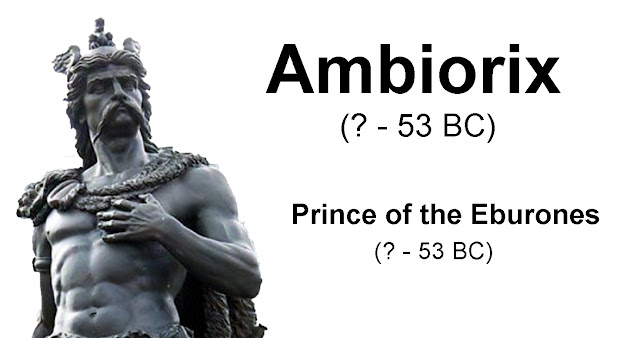Wednesday, April 12, 2023
The Belgae Tribes and the Roman conquest of Belgium
The Belgae were a group of tribes living in northern Gaul, on the west bank of the Rhine, from at least the third century BC. They gave their name to the Roman province of Gallia Belgica, and very much later, to the modern country of Belgium.
From 500 BC Celtic tribes settled in the region of present day Belgium, and traded with the Mediterranean world. The Roman influence penetrated into those areas about 150 BC., when the first coins came into use.
Julius Caesar describes Gaul at the time of his conquests (58–51 BC) as divided into three parts, inhabited by the Aquitani in the southwest, the Gauls of the biggest central part, and the Belgae in the north. Each of these three parts was different in terms of customs, laws, and language.
He noted that the Belgae, were "the bravest, because they are furthest from the civilization and refinement of [our] Province, and merchants least frequently resort to them, and import those things which tend to effeminate the mind; and they are the nearest to the Germans, who dwell beyond the Rhine , with whom they are continually waging war".
For a long time the Belgae were considered to be Gallic people, or a Germanic people dominated by a Gallic aristocracy (hypothesis suggested by the fact that the names of the Belgae chiefs are of Celtic origin, as well as ancient and non-Germanic toponyms).
More precise analyzes of the names of the tribes, their chiefs and their gods lead to these various assumptions: some tribes would be genuinely Gallic (such as the Remi, the Bellovaci, the Morini or the Atrebates), others would show Germanic features (Nervii, Aduatuci, Condrusi, Menapii, Treveri ...) according to Caesar.
Caesar reported that the more northerly allies of the Belgae, from west to east the Menapii, Nervii, and Germani cisrhenani, were less economically developed and more warlike, similar to the Germani east of the Rhine river. The Menapii and northern Germani lived among low thorny forests, islands and swamps, and the central Belgian Nervii lands were deliberately planted with thick hedges, in order to be impenetrable to cavalry.
During the late 2nd or early 1st century bc, a small group of Belgae crossed to Britain. After further Gallic victories by Caesar, other settlers took refuge across the Channel, and Belgic culture spread to most of lowland Britain. The three most important Belgic kingdoms, identified by their coinage, were centred at Colchester, St. Albans, and Silchester. The chief Belgic contribution to southern Britain was the introduction of the heavy plow, which was used to clear many lands previously untillable.
Caesar writes that the Belgae were conspiring and arming themselves in response to his earlier conquests; to counter this threat, he raised two new legions and ordered his Gallic allies, the Aedui, to invade the territory of the Bellovaci, the largest and fiercest of the Belgae tribes, in 57 BC.
Cautious of the numbers and bravery of the Belgae, Caesar initially avoided a pitched battle, resorting mainly to cavalry skirmishes to probe their strengths and weaknesses. Once he was satisfied his troops were a match for them, he made camp on a low hill protected by a marsh at the front and the river Aisne behind, near Bibrax (between modern Laon and Reims) in the territory of the Remi.
The Belgae attacked over the river, but were repulsed after a fierce battle. Realising they could not dislodge the Romans and aware of the approach of the Aedui into the lands of the Bellovaci, the Belgae decided to disband their combined force and return to their own lands. Caesar's informants advised him that whichever tribe he would attacked first, the others would come to their defence. At daybreak, Caesar sent his cavalry to harass the rear guard of the Belgae, killing many of them.
Caesar next marched into the territory of the Suessiones and besieged the town of Noviodunum (Soissons). Seeing the Romans' siege engines, the Suessiones surrendered, whereupon Caesar turned his attention to the Bellovaci, who had retreated into the fortress of Bratuspantium (between modern Amiens and Beauvais). They quickly surrendered, as did the Ambiani.
The Nervii, along with the Atrebates and Viromandui, decided to fight. They concealed themselves in
the forests and attacked the approaching Roman column at the river Sabis. Their quick and unexpected attack left the Romans exposed. However, Caesar grabbed a shield, made his way to the front line, and quickly organised his forces. The two Roman legions guarding the baggage train at the rear finally arrived and helped to turn the tide of the battle. Caesar says the Nervii were almost annihilated in the battle, and is effusive in his tribute to their bravery, calling them "heroes".
The Atuatuci, who were marching to their aid, turned back on hearing of the defeat and retreated to one stronghold, were put under siege, and soon surrendered and handed over their arms. However, the surrender was a ploy, and the Atuatuci, armed with weapons they had hidden, tried to break out during the night. The Romans had the advantage of position and killed 4000. The rest, about 53 thousand, were sold into slavery.
In 53 BC, the Eburones, led by Ambiorix, along with the Nervii, Menapii, and Morini, revolted again and wiped out 15 cohorts, only to be put down by Caesar. The following year, Belgae fought again, in the uprising of Vercingetorix.
After their final subjugation, Caesar combined the three parts of Gaul, the territory of the Belgae, Celtae, and Aquitani, into a single unwieldy province (Gallia Comata, "long-haired Gaul").








